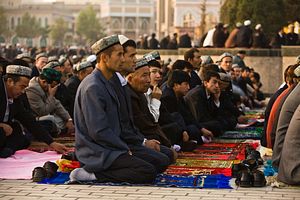Your Friday China links:
Writing for the Los Angeles Review of Books, James Millward of Georgetown University takes a deeper look at the issues in Xinjiang. “Beijing has two problems with the Uyghurs,” he writes: terrorism and civil rights.
Millward writes that, until recently, much of the violence in Xinjiang seemed more related to the later rather than the former. Taking the deadly riots in Urumqi in 2009, Millward points out that the violence was more akin to race riots — “indicative not of foreign-organized or -inspired jihadism, but of deepening tensions between Uyghur and Han at home.” Uyghur discontent, including higher unemployment rates, discrimination, and “casual racism” on the part of many Han Chinese, was the driving force behind such incidents. In recent months, however, there’s been an increase in textbook acts of terrorism, including suicide attacks and bombs placed in crowded public areas.
Millward explores the extent of Uyghur repression, including restrictions on Uyghur language, dress, and religious expression (from fasting during Ramadan to the wearing of veils). Then he asks the million dollar question: is Uyghur discontent over a lack of civil rights causing the increase in terrorism? Millward argues that both internal (repressive policies) and external (foreign jihadist groups) forces are at play. As a result, “addressing the terrorism problem should not preclude but should rather lend urgency to addressing the civil rights problem.”
Turning to another major ongoing story, the U.S. indictment of five PLA officers, Foreign Policy presents the inside story of the FBI’s investigation. The FBI case is unusual because it resulted in formal charges — generally, cybersecurity move and countermoves play out entirely behind the scenes. But the Obama administration had been preparing to go public for years. A new National Security Cyber Specialist unit was created in the Justice Department in 2012 specifically to investigate and (eventually) prosecute cyber cases. In fact, FP says, a case against Chinese hackers would have been brought sooner but for the Snowden leaks, which put the cyber spotlight squarely on the U.S.
FP notes that the end goal of the indictment is to publicly reveal the extent of Chinese spying in order to nudge China to stop (or at least slow down) its economic espionage. In the future, the Justice Department might charge specific Chinese companies alleged to have benefited from hacking. Such companies could be banned from doing business in the U.S. Meanwhile, it’s not just China — officials cited by FP say the next charges filed may be against Russia.
Over at the Wall Street Journal, the China Real Time blog looks into the importance of the “Selden Map,” a Ming-dynasty map (believed to date from between 1566 and 1620)of trade routes linking China with Southeast Asia, the Middle East, and even Europe and the Americas. According to historian Timothy Brook, the map shatters the historical perception that China was a passive recipient of trade from other regions. Instead, the trading routes show China itself was active in carrying out trade. Interestingly, the map is largely centered around the now hotly-disputed South China Sea. WSJ doesn’t mention the potential political significance of the Selden map, but in China it’s likely taken as evidence that the South China Sea has been dominated by China for hundreds of years.
Finally, I noted earlier this week that Obama’s emphasis on U.S. global leadership would not sit well in China. Sure enough, Foreign Ministry spokesman Qin Gang responded to Obama’s speech in a press conference. “It seems that the US really enjoys being the leader of the world,” Qin said, before launching into a history lesson: “China once led the world for more than one hundred years.” Qin’s talk about 2,000 year old histories and emperors was meant to convey one point — the U.S. could easily lose its global leadership position.

































